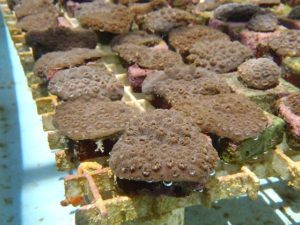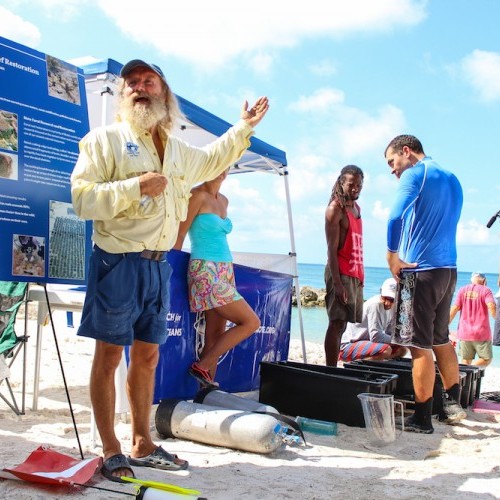On Monday, June 13 scientists at Mote Marine Laboratory launched a coral restoration project at Fort Zachary Taylor Historic State Park in Key West, Florida with a goal of creating a publicly accessible coral restoration site at the State Park while demonstrating the techniques of current restoration strategies happening at Mote.
 Throughout the day, scientists and volunteers planted about 200 live coral fragments in the waters off Key West’s Fort Zachary Taylor Historic State Park. Scientists hope to plant about 5,500 corals by the end of July.
Throughout the day, scientists and volunteers planted about 200 live coral fragments in the waters off Key West’s Fort Zachary Taylor Historic State Park. Scientists hope to plant about 5,500 corals by the end of July.
“Within a couple of years, the coral fragments that were planted today will grow into each other and grow into a living reef that is beautiful for people to enjoy as a snorkel trail and so it can help prevent erosion of this beautiful beach,” Dr. David Vaughan, Executive Director of Mote’s Florida Keys campus.
To restore coral reefs at the State Park, Mote scientists employed their cutting-edge reef-building technique called “re-skinning,” which enables small fragments of boulder corals such as brain, mountainous star coral and great star coral from Mote’s Summerland Key coral nursery to rapidly fuse back together to form new coral heads over the dead skeletons of depleted reefs.
An especially unique feature of this project is that it uses corals rescued by the National Oceanic Atmospheric Administration from the same general area where restoration is occurring. The corals have since been propagated by Mote scientists at their land-based coral nursery in Summerland Key for the purpose of outplanting back into the natural environment at Fort Zachary Taylor Historic State Park.
“This is a new, fantastic opportunity for the public to see this coral restoration project happening right here without even having to take a boat,” said Seth Morton, Superintendent of NOAA’s Florida Keys National Marine Sanctuary. “Fort Zachary Taylor Historic State Park is such a unique place and this is a unique partnership we have continued through the Florida Keys Eco-Discovery Center and we encourage everyone to come out and see what is being done right in our own backyard.”
 On Monday, scientists and volunteers outplanted fragments of brain, mountainous star and great star corals in 10 to 12 feet of water about 20 feet beyond the breakwater off the State Park’s shore. All work is being conducted under permits from NOAA and Florida State Parks.
On Monday, scientists and volunteers outplanted fragments of brain, mountainous star and great star corals in 10 to 12 feet of water about 20 feet beyond the breakwater off the State Park’s shore. All work is being conducted under permits from NOAA and Florida State Parks.
“The Florida Park Service is very proud to be part of such an incredible project with Mote and NOAA,” said Anthony Knott, Park Manager, Fort Zachary Taylor Historic State Park. “It is a great opportunity to have our visitors be able to experience something like this. This is a great partnership and we’re excited to be a part of it.”
With this groundbreaking technique, Mote scientists are working to restore large areas of these major reef-building corals in just one to three years – instead of the hundreds of years it might take for natural recovery.
This collaborative project between Mote, Florida State Parks, NOAA’s Florida Keys National Marine Sanctuary and the Monroe County Tourist Development Council seeks to restore corals at Fort Zachary Taylor Historic State Park while educating people about the importance of reefs and asking volunteer “citizen scientists” to help.
“We at Mote are so incredibly grateful for the Tourist Development Council, which helped to make this project possible, those at the beautiful Fort Zachary Taylor Historic State Park and those at NOAA’s Florida Keys National Marine Sanctuary,” Vaughan. “With this project, we’re using a unique technique needed to be able to replant the under water forest and with the help of citizen scientist we were able to move toward that goal.”
Coral reefs are ecologically and economically important. Coral reef ecosystems provide critical habitat for a wide range of fish and invertebrates (crab, shrimp, lobster). Ecologically, they are essential for many species that rely on their habitat for food, shelter and breeding. Coral reefs also provide protection for our shorelines during tropical storms and hurricanes due to their massive structures.
Economically, coral reefs support many species that are important for recreational and commercial interests and they provide recreational activities including diving and snorkeling. In southeast Florida alone, coral reefs are estimated to value $8.5 billion and generate over 70,000 jobs.
Educational signs at Fort Zachary Taylor Historic State Park and NOAA’s Florida Keys Eco-Discovery Center in Key West will provide information and education about the reef restoration methods and conservation activities for years to come.
Program participants and visitors to both Fort Zachary Taylor Historic State Park and the Florida Keys Eco-Discovery Center will be able to further engage with the ongoing restoration efforts by becoming volunteer “citizen scientists” for this project and learning through educational signs with information about corals, Mote’s research and what they can do to help coral reefs.
How you can help with this coral restoration project:
Volunteers will assist researchers via snorkel, while also enjoying the replanted coral habitat. Volunteers will be asked to help Mote scientists with non-technical help such as handing and supplying materials needed to outplant corals while snorkeling, assist with additional photo-monitoring via snorkel and from the beach, and educating the public about the project.
*Pre-registered volunteers will receive free access to Fort Zachary Taylor Historic State Park on the day they are volunteering. All others who have not pre-registered to help with the project must pay the park’s regular admission price, which can be found on www.floridastateparks.org/park/Fort-Taylor. Free park access only applies to the day the volunteer is actively helping in the project.
In July, Mote is looking for 20 planting days, with confirmed dates published at the end of June.
Please keep in mind that activities are dependent upon weather, waves and visibility underwater.
Up to five volunteers each day can assist both on land and in the water. All volunteers must have their own snorkeling equipment and are responsible for their own safety in the water.
Coral planting will begin at 9 a.m. and end around 2 p.m., but can shift depending upon the tides. Any changes in timing will be emailed to volunteers. The meeting point for the volunteer efforts will be by the Refreshment Center at Fort Zachary Taylor Historic State Park.
If you would like to volunteer for this project, please fill out this Google Form.
If you have any other questions about volunteering at Mote, please contact " target="_blank">.
Source: Mote scientists launch coral restoring project in Key West
